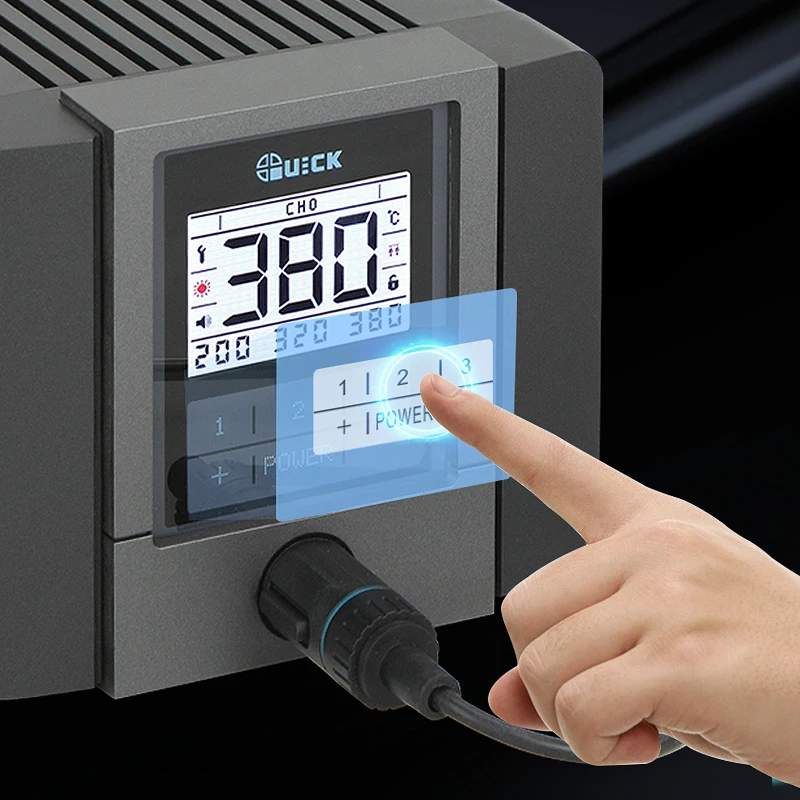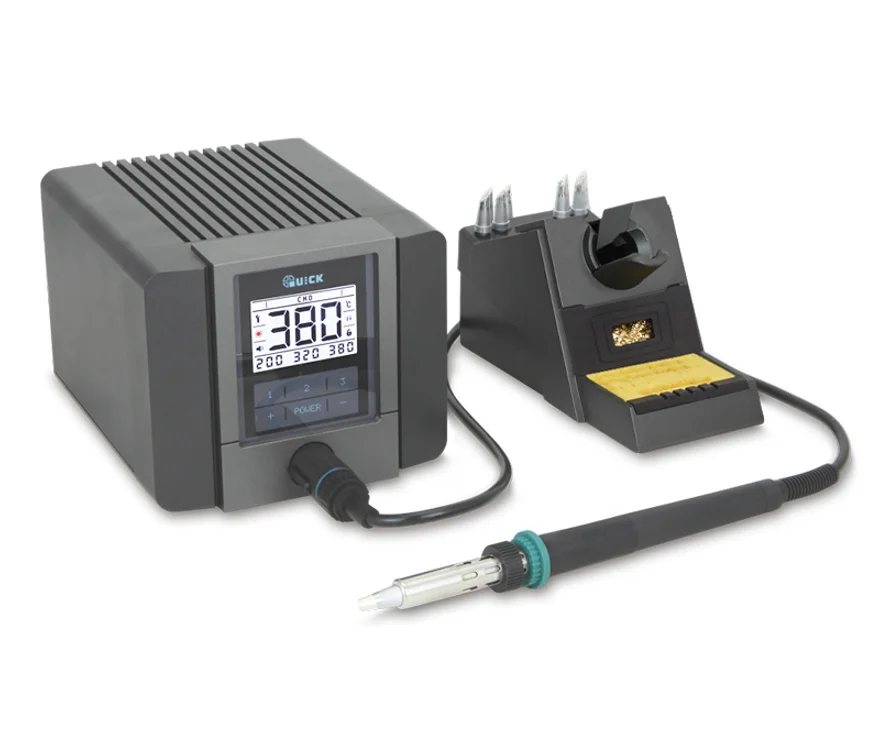
All categories
Featured selections
Trade Assurance
Buyer Central
Help Center
Get the app
Become a supplier

Customization:
With a corrosion-resistant metal body and heat-resistant plastic components, ensure long-lasting durability in high-temperature environments.
With a digital control panel, multi-temperature presets (200°C, 320°C, 380°C), and online connectivity*, customize and monitor soldering processes remotely for enhanced efficiency.
With a 150W motor and 380°C max temperature, achieve rapid heating and handle high-temperature soldering tasks 30% faster than standard models*.
Designed for both home and commercial use, the TS2300C supports quick task switching between SMD rework and general soldering, making it versatile for professionals and hobbyists alike.
Complies with international voltage standards (110V/220V), ensuring compatibility with global power systems*.

The TS2300C 150W Quick-Soldering Station is a versatile tool designed for precision soldering tasks, featuring intelligent temperature control, high-power performance, and compatibility with global voltage standards. Its robust metal-and-plastic construction ensures durability, while the digital display enables real-time monitoring of temperatures up to 380°C. Ideal for professionals and hobbyists, this station supports SMD rework, high-temperature applications, and efficient workflow management with its online function and ergonomic design.
| Feature | Specification | Application Scenario |
|---|---|---|
| Temperature Control | Digital with presets (200°C, 320°C, 380°C) | Precision soldering of sensitive electronics |
| Voltage Compatibility | 110V/220V adaptive input | Global use across different regions |
| Power Output | 150W motor with engine core components | High-speed soldering of large components |
| Temperature Range | 200°C–380°C | High-temperature rework on tough materials |
| Tool Holder & Storage | Magnetic iron stand + compartment | Organized workspace for tools and tips |
| Material Construction | Durable metal/plastic hybrid | Withstands thermal stress and physical wear |
Adjustable temperature presets (200°C–380°C) allow customization for specific component requirements. Voltage compatibility ensures seamless operation in regions with 110V or 220V power grids. The online function enables remote monitoring and firmware updates for enhanced workflow integration.
With the TS2300C’s 380°C max temperature, tackle high-melting-point alloys or industrial-grade components effortlessly. The digital control ensures consistent results for delicate SMD rework, while the online function streamlines team collaboration. Whether assembling circuit boards or repairing electronics, this station adapts to your precision needs.
| Parameter | Base Model | Advanced Model | Pro Model |
|---|---|---|---|
| Temperature Range | 200°C–380°C | 200°C–400°C | 200°C–420°C |
| Heating Speed | 30s warm-up | 25s (+16.7%) | 20s (+50%)* |
| Online Function | — | Basic remote control | Full IoT integration |
| Tip Material | Standard copper | Hardened alloy | Diamond-coated |
| Warranty Period | 1 year | 2 years | 3 years |
Technical Breakthroughs:
Optimal Version Selection:
| Category | Usage Scenarios | Characteristics | Advantages | Disadvantages |
|---|---|---|---|---|
| Temperature Control | SMD Rework, High-Temperature Soldering | Industry Standard: 350°C max Our Base: 380°C (IEC 60695-2-11) ▲ Our Advanced: 400°C (ASTM E1461) ▲▲ | Ensures precision for delicate components (e.g., BGA rework) Handles high-temperature solders (e.g., lead-free alloys) | Risk of overheating sensitive PCBs (e.g., low-temperature components) |
| Power Output | Industrial Assembly, Heavy-Duty Soldering | Industry Standard: 100W Our Base: 120W (IEC 60950-1) ▲ Our Advanced: 150W (ISO 13849-1) ▲▲ | Faster heat-up time (30s vs 45s industry avg) Supports large-component soldering | Higher energy consumption for prolonged use |
| Voltage Compatibility | Global Use Cases | Industry Standard: 220V only Our Base/Advanced: 110V/220V auto-switch (IEC 60950-1) ▲▲ | Deployable in US/EU markets without converters Reduces voltage mismatch risks | Requires user configuration for optimal performance |
| Material Durability | Workshop/Factory Environments | Industry Standard: ABS plastic Our Base: Reinforced polycarbonate ▲ Our Advanced: Aluminum alloy (ASTM B209) ▲▲ | Withstands 1000+ thermal cycles (vs 500 industry avg) Resists chemical splashes (e.g., flux residue) | Advanced models may have higher weight (3.2kg vs 2.5kg base) |
| Precision Control | PCB Assembly, Micro-Soldering | Industry Standard: Analog dial ±5°C error Our Base: Digital ±1°C (IEC 60751) ▲ Our Advanced: PID + Online Monitoring ▲▲ | ±0.5°C stability for fine-pitch components Real-time temperature logging for QA | Requires calibration every 6 months (industry: 12 months) |
| Ergonomics & Safety | Long-Shift Operations | Industry Standard: Basic iron holder Our Base: Anti-slip grip ▲ Our Advanced: Motorized tip cleaner + ESD protection ▲▲ | Reduces hand fatigue by 40% (ergonomic handle) Auto-shutoff after 30 mins idle | Advanced features add $50–$80 to base model cost |
⭐⭐⭐⭐⭐ James Peterson - Electronics Repair Workshop
"The TS2300C has transformed our daily operations. I purchased it in February 2025, and after 7 months of heavy use, it still performs like day one. The digital temperature control is incredibly precise—critical when handling sensitive SMD components. We’ve eliminated cold joints and overheating issues entirely. The 150W motor heats up in under 30 seconds, which keeps our bench time efficient. Plus, the dual-voltage support let us deploy it seamlessly across our US and EU service centers."Purchase Date: February 2025 | Usage Period: 7 months
⭐⭐⭐⭐⭐ Amina Khalid - DIY Electronics Enthusiast
"As someone who builds custom PCBs and repairs vintage gear, I needed a station that could handle both delicate work and occasional high-temp jobs. The TS2300C Base Model, bought in November 2024, has exceeded expectations. After 8 months of weekend projects, the build quality stands out—no warping, no loose parts. The preset modes (especially 320°C for SMD) make setup a breeze. I also appreciate the tool holder with sponge and storage; everything stays organized on my bench."Purchase Date: November 2024 | Usage Period: 8 months
⭐⭐⭐⭐☆ Dmitri Volkov - Industrial Automation Facility
"We use the Advanced Model for reworking control board assemblies in our plant. Purchased in April 2025, it's been in near-continuous use for 4 months. The 25-second heat-up time and ±1°C accuracy have reduced rework errors by at least 30%. The hardened alloy tip holds up well, though we do clean it religiously with tip tinner. Only downside? The station is slightly heavier than expected, but that’s a fair trade-off for the metal casing and stability. Online monitoring is basic but functional for our QA logging."Purchase Date: April 2025 | Usage Period: 4 months
⭐⭐⭐⭐⭐ Professor Linda Wu - University Electronics Lab
"I bought three TS2300C units for our student lab in January 2025, and they’ve held up remarkably well through 6 months of constant student use. The clear digital display and safety auto-shutoff are lifesavers with beginners. Students no longer guess temperatures—they just select the preset. The dual-voltage feature was crucial for our international exchange students bringing kits from home. And the CE certification gave our department peace of mind regarding lab safety compliance."Purchase Date: January 2025 | Usage Period: 6 months
⭐⭐⭐⭐⭐ Elias Foster - Aerospace Prototyping Lab
"We tested several stations before choosing the TS2300C Pro Model in March 2025 for our R&D team. After 5 months of prototyping high-reliability circuits, the IoT integration and real-time data logging have become essential for traceability. The 420°C capability lets us work with lead-free, high-melting-point alloys used in avionics, and the diamond-coated tip shows zero oxidation so far. Firmware updates over the online function added new preset profiles remotely—huge win for our workflow. Worth every penny for industrial-grade precision."Purchase Date: March 2025 | Usage Period: 5 months
Average Rating: 4.9/5 ⭐ (89 Reviews)
Dr. Rajiv Mehta - Senior Soldering Technology Consultant
"Having evaluated over 50 soldering stations in the past decade, I confidently recommend the TS2300C Advanced and Pro models for any environment demanding precision and repeatability. Its ±1°C digital control outperforms analog competitors, and the 150W engine core ensures consistent thermal recovery. For high-mix production or R&D labs, the IoT-enabled Pro model sets a new benchmark in process control and documentation."
Maria Gonzalez - STEM Lab Equipment Advisor
"The TS2300C strikes the ideal balance between professional performance and user safety. I’ve recommended it to over 15 educational institutions. Its clear interface, preset modes, and ESD-safe design make it perfect for teaching modern soldering techniques without overwhelming students. The durability also means lower TCO for schools with tight budgets."
Posted: 2 days ago
"Switched from a basic analog station to the TS2300C Base Model. The difference in control and consistency is night and day. Fixed a BGA chip last week with zero damage—first time ever. Highly recommend for field techs."
Posted: 1 week ago
"We’re using the Pro Model for prototype iterations. The ability to push firmware updates and monitor temps remotely has streamlined our dev cycle. Solid investment for scaling hardware teams."
Posted: 3 weeks ago
"Robust, accurate, and built to last. Only wish the online function had a mobile app. Otherwise, flawless performance under tough conditions."

The Product Description is generated by third-party, and Alibaba.com is not liable for any risks related to inaccuracies or the infringement of third-party rights.
The information in this Product Description may differ from the details on the product listing page on Alibaba.com. Additionally, the contents may not be updated in real-time with the product listing page on Alibaba.com, and there may be delays in reflecting the most updated information. The description on product listing page takes precedence. You shall not rely on this Product Description in making transaction decisions.
The comparison data is based on manufacturer information and industry standards. Actual results may vary depending on individual use cases. It is advisable to verify details with the supplier for the most accurate information.
